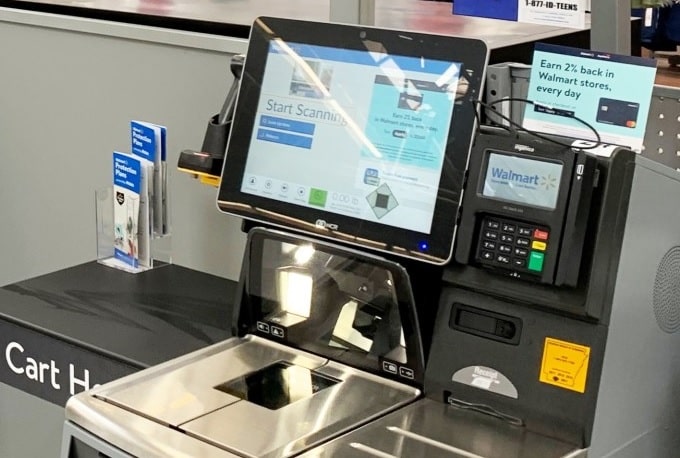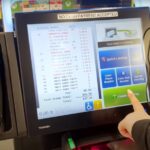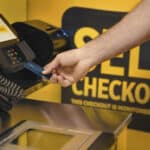
Tired of dealing with life’s little annoyances at the grocery store? There ought to be a law! And if some state lawmakers have their way, there will be.
Right on the heels of a New Jersey legislator’s proposal to require retailers to offer paper alternatives to digital coupons, a Rhode Island legislator is taking aim at self-checkouts. Supermarkets should only have so many, she says, they should have an equivalent number of staffed checkout lanes – and they should give you a 10% discount for scanning and bagging your own groceries.
Democratic state representative Megan Cotter is spearheading an effort to amend Rhode Island state law pertaining to grocery stores. She and nine co-sponsors from both sides of the aisle have introduced a bill that would limit and regulate self-checkouts.
“Grocery stores shall not have more than eight self-service checkout stations operating at any one time per location,” the bill states. “Grocery stores with self-checkout stations shall have a minimum of one manual checkout station per (self-checkout) station,” it goes on. And “grocery stores shall pay the consumer a ten percent discount for self-service checkout where that checkout involves ten or more items.”
The proposed legislation is meant to protect grocery employees, self-checkout users and those who prefer not to use self-checkout, Cotter explains. Self-checkouts allow grocery retailers “to decrease labor costs… rely more heavily on part-time employees… and contribute to retail workers feeling devalued,” the bill reads.
“There are also many people who want the advantages of checking out with a real human being,” Cotter said in a statement. Elderly and disabled customers “often lack the confidence or ability
to use self-service checkouts,” the bill reads. And the increasing use of self-checkouts “contributes to social isolation and related negative health consequences.”
The bill also addresses perhaps the most frequent complaint aimed at self-checkouts: “Self-checkout is a way grocery stores are avoiding paying employees by getting customers to do cashiers’ jobs for free,” Cotter said. That’s the thinking behind the proposed 10% discount for self-checkout users. “It seems only fair that if they are going to take on cashiers’ work, the customer should get something in return,” she explained.
Others have tried implementing several of the solutions that Cotter’s bill proposes. In 2019, an Oregon grocery employees’ union launched a ballot initiative to mandate that “grocery stores cannot have more than two self-service checkout stations operating at any one time per location.” That initiative failed to make it to a vote. Last year, a California shopper filed a lawsuit against Albertsons, seeking to force the grocer to pay self-checkout users “at least the minimum wage” for “the uncompensated work performed by their customers.” A judge ultimately threw out the suit. In 2019, though, an Australian grocery chain volunteered compensation to self-checkout users, offering them a 25% discount for using its “Scan & Go” system.
But not everyone is looking to limit self-checkouts. Stores like Kroger, Walmart and Albertsons have experimented in recent years with offering self-checkout-only stores. Kroger doesn’t have any stores in Rhode Island, but Walmart and Albertsons (Shaw’s) do. If they were thinking about opening any self-checkout-only stores in Rhode Island, that plan would be a no-go if Cotter’s bill were to become law. The bill proposes a fine equal to a full day’s pay for a cashier, for each violation.
Too many stores are offering “fewer staffed checkouts and keeping those lines long to push people toward the self-checkout whether they like it or not,” Cotter said. “The big corporations that own grocery chains no doubt hope the public will just slowly continue to accept this effort.”
Cotter said she’s willing to negotiate the details, and doesn’t expect the bill to pass “exactly as currently written.” But she hopes it will “start a conversation” about self-checkouts.
And if years of debates, disputes, discussions and disagreements are any guide – if there’s one thing grocery shoppers like having conversations about, it’s just how strongly they feel about doing a cashier’s job for free.
Image source: Walmart











The SHOULD be a discount for self check- out. A super market is not paying someone to work a register. Actually, people should band together and not use self check-outxuntil we DO get a discount.
If this proposed law is passed, all I see as a result is even MORE reliance on self-checkout. 10% off for using self-checkout just means the affected stores will raise prices on everything in store by 10% (probably more) so net effect is manual checkout users end up paying more than self-checkout users.